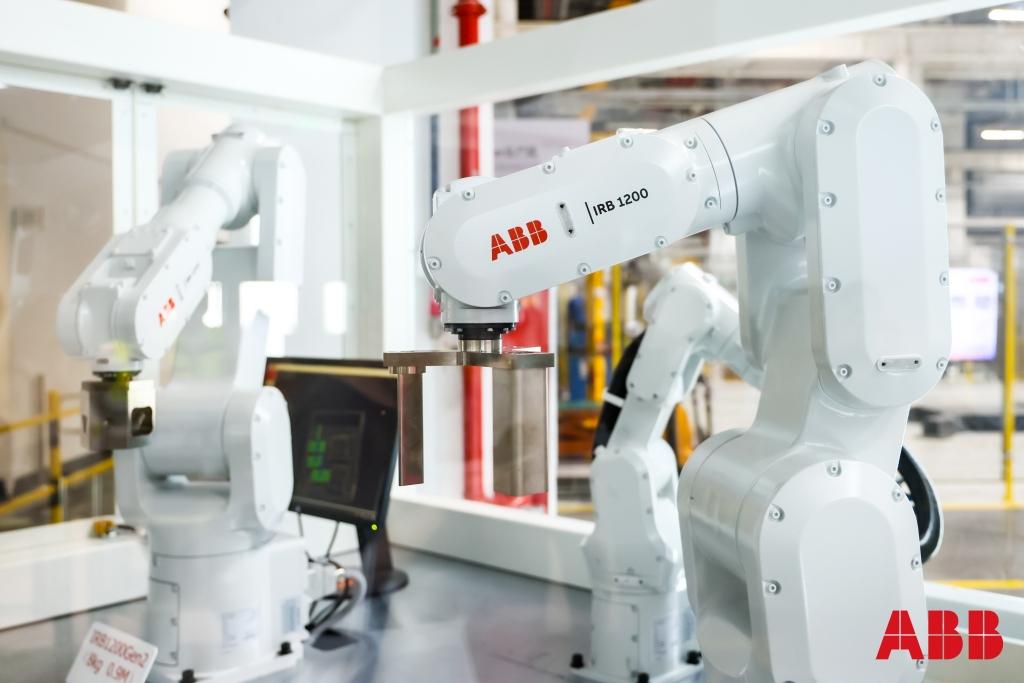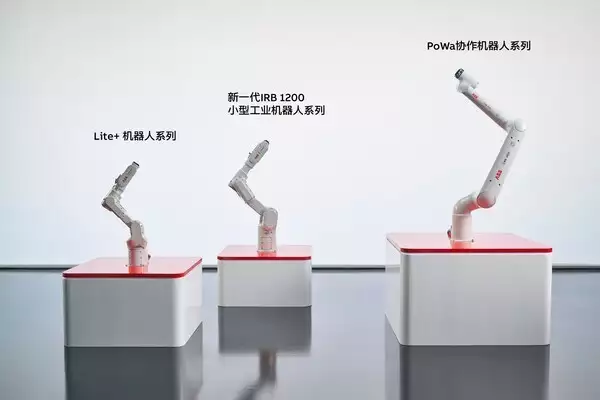
"Chinese robots account for more than 50% of the global market. If we do well in China, then our global business will definitely do well; products that are viable in China will definitely be viable all over the world."
At the ABB Robot new product launch held on July 2, Han Chen, senior vice president of ABB Group and president of Robot China, made the above statement.
China is ABB's largest robot delivery market in the world. At present, more than 90% of the robots delivered by ABB Robot to Chinese customers are produced locally.
On December 2, 2022, the ABB Robot Super Factory officially went into production in Pudong New Area, Shanghai, with a total investment of US$150 million (about RMB 1.1 billion). Han Chen revealed that on this basis, ABB Robot will continue to increase its investment in China.
According to Han Chen, the servo motor production line of the ABB Robot Shanghai Super Factory has officially started production, with an annual output of about 60,000 units, which will be directly supplied to ABB's robot products. In addition, ABB Robot's new automated spray room will also be put into operation. This is China's first fully automated spraying production line for industrial robot products.
ABB is a global leader in electrical equipment and automation technology, one of the world's top 500 companies, headquartered in Zurich, Switzerland. The company is currently divided into four major divisions: electrical, motion control, process automation, and robotics and discrete automation. Among them, the electrical division has the largest revenue share, accounting for about 47% last year.
ABB is also one of the world's four major robot "four families". Its robotics business unit is now affiliated with the Robotics and Discrete Automation Division, competing with Japan's FANUC, Japan's Yaskawa, and Germany's Kuka.
In April this year, ABB announced that it plans to submit a 100% spin-off of its robotics business unit to the 2026 annual shareholders' meeting for deliberation. The goal is to promote the business to start trading as an independent listed company in the second quarter of 2026.
Regarding this independent split, ABB Group Robotics and Discrete Automation Division President An Shiming said at the media conference of ABB Accelerator China Week held in May that the split decision can essentially help the group focus more on business planning and governance, as well as the robotics industry itself.
At the same time, the independent split can achieve better capital allocation for the robot business, making the robot business more flexible and operational, with more investment in R&D, so as to better cooperate with the outside world.
ABB Robotics entered China in 1994 and is the world's first multinational robot supplier to establish a complete value chain in China, that is, it has laid out the entire value chain from production to R&D to sales and after-sales in China.
Due to geopolitical issues, ABB Robotics is still reshaping the resilience of its supply chain in China.
"This year, the proportion of domestic suppliers will reach about 80%, which can basically achieve a closed loop in the Chinese supply chain and will have a stronger resistance to the entire geopolitics." Han Chen said.
At the press conference that day, Ma Sikang, global president of ABB Robotics Business Unit, told Jiemian News that as the world's largest robot market, the Chinese market is showing a dynamic and rapid development trend, which is challenging, and companies need to keep learning to adapt to its changes.
Ma Sikang pointed out that in the past few years, China's robot industry, especially the field of collaborative robots, has grown significantly, which is mainly affected by two factors:
On the one hand, with the development of the domestic economy, more and more small enterprises have begun to deploy automation. "Even if they don't have a large factory, they still need small and compact automated robots to help them do some automated work." Ma Sikang said.
On the other hand, the market demand for collaborative robots and collaborative production workshops has increased, and large factories have begun to need human-machine collaboration to work.
Han Chen also pointed out that in recent years, ABB has found that Chinese customers have some special needs that do not appear in other countries. ABB's internationally general products are poorly adaptable in these markets, and there are problems of acclimatization, resulting in the failure to increase the terminal market share.
In 2024, against the background of continued weak downstream demand and the gradual rise of local robot companies, ABB's China Robotics and Discrete Automation performance fell by 12.4% year-on-year.
In order to solve the problem of stagnant development in the Chinese market, ABB Robotics launched the localization strategy of "Lingyu Huazhang" last year.
Based on this, the three new robot series recently released by ABB Robotics have significantly improved their relevance to the Chinese market.
According to Han Chen, the newly launched IRB 1200 small industrial robot was developed by Chinese R&D engineers based on the Chinese supply chain. Aiming at the global market, it is optimized for high-speed and high-precision applications such as assembly, polishing, and gluing. Compared with the previous generation of products, the new generation IRB 1200 has a 5% shorter cycle time and a 20% lighter weight.
The cycle time refers to the interval between the continuous completion of two identical products (or two services, or two batches of products).
Han Chen pointed out that as China's market share in industrial robots increases, ABB Robotics will naturally take into account the Chinese market factors in the product design stage.
"In China, we have the largest customer base and the most application scenarios. The research and development of many products will first consider the development in China." Han Chen said.
In response to the needs of Chinese customer market segments, in application scenarios such as material handling and picking and placing with low requirements for accuracy, speed, and product life, ABB Robotics has launched a new Lite+ robot series, which will be available in China and Asia. The Lite+ robot series is easy to deploy, lowering the threshold for automation applications for small enterprises.
The new PoWa collaborative robot series released by ABB Robotics is a high-speed collaborative robot series customized for the Chinese market, which can meet the needs of Chinese customers for both speed, safety and reasonable price.
The PoWa collaborative robot series is designed for compact environments and is particularly suitable for tasks that require extremely high speed, collaboration and efficiency, including fast picking and placing, palletizing, machine tool loading and unloading, arc welding and screwing. It is mainly aimed at China's rapidly growing general industrial fields, including consumer goods and electronics manufacturing.
"The launch of such a full range of products will enable ABB to further develop in the Chinese collaborative robot market." Han Chen said.



